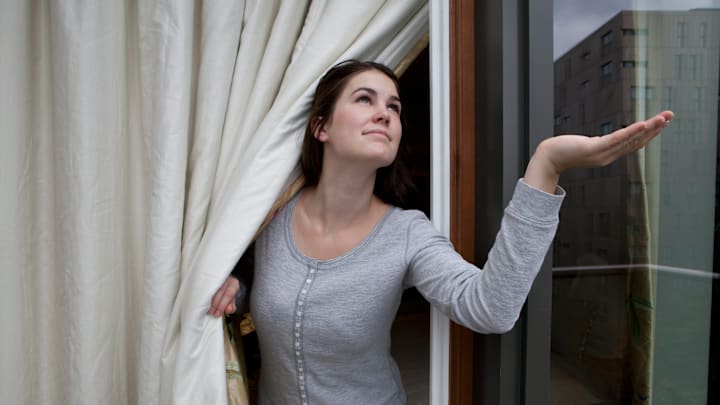In 1975, New York housewares store Zabar’s created a consumer frenzy when it offered a Cuisinart food processor for just $135—a $55 reduction in its $190 retail price. Demand was so high that they sold out immediately. To placate those who missed out, the store began issuing rain checks that entitled the bearer to the $135 price when the store finally replenished its stock.
Zabar’s didn’t coin the idiom rain check, though it certainly made good use of it. It’s come to mean a voucher that promises to make good on a product, price, or event that’s not currently available. Or, it might indicate that someone is opting to recuse themselves from an engagement. “I’ll take a rain check on that dinner,” you might say, particularly if you don’t really want to go. So where did the phrase come from?
The Origins of the Phrase Rain Check
According to the Oxford English Dictionary, rain check originally had a very literal meaning. In the 1880s, baseball team management needed a system to reassure spectators who paid admission for games held in open-air stadiums. In the event of rain, the playing field would become muddy and untenable. But that wasn’t really the fault of the attendees or the teams.
To solve the problem, management began issuing rain checks, which essentially promised ticket holders a do-over. If they arrived to a game and it had to be canceled due to weather, the rain check ensured they wouldn’t be out any money and could return for another game without additional charge.
Early on, the system wasn’t widely understood. In the June 3, 1887, edition of the Detroit Free Press, a columnist described some confusion arising from fans being handed a paper slip upon entering:
“When the gates were opened yesterday a man was stationed at each turnstile with handful of rain checks, which they handed to each person who entered. A number of persons, probably supposing they were patent medicine ads, refused to take them. The management, hoping but not knowing that the grounds could be gotten into shape, decided to issue these rain checks. Immediately on the announcement of no game a number of persons rushed to the ticket office and demanded rain checks, saying they had not received them.”
The article went on to describe police having to intervene “to prevent [spectators] tearing the building down.”
Baseball fans quickly grew to understand the system, with some opting to exploit it. In 1888, three men were arrested in Philadelphia after collecting rain checks and then attempting to sell them below the face value of admission.
From Baseball to Backing Out of Brunch
Using rain check to politely bow out of a personal obligation followed in the late 1800s. By the mid-20th century, however, rain check was also being used as a way of offering personal favors. Giving a rain check as a gift meant promising to perform a task like knitting a sweater or walking a dog.
It’s not quite clear when rain check moved from outdoor events and personal commitments to retail sales, though the OED dates its first use in that context to the 1950s. Often, a store would promise to honor an advertised price on an out-of-stock item for a finite period of time.
As for Zabar’s: Rain check holders for the Cuisinart had to wait a year before the store replenished its stock and began honoring the vouchers for 962 customers. By that point, the small appliance was selling for $225.
Read More Stories About Language Here:
